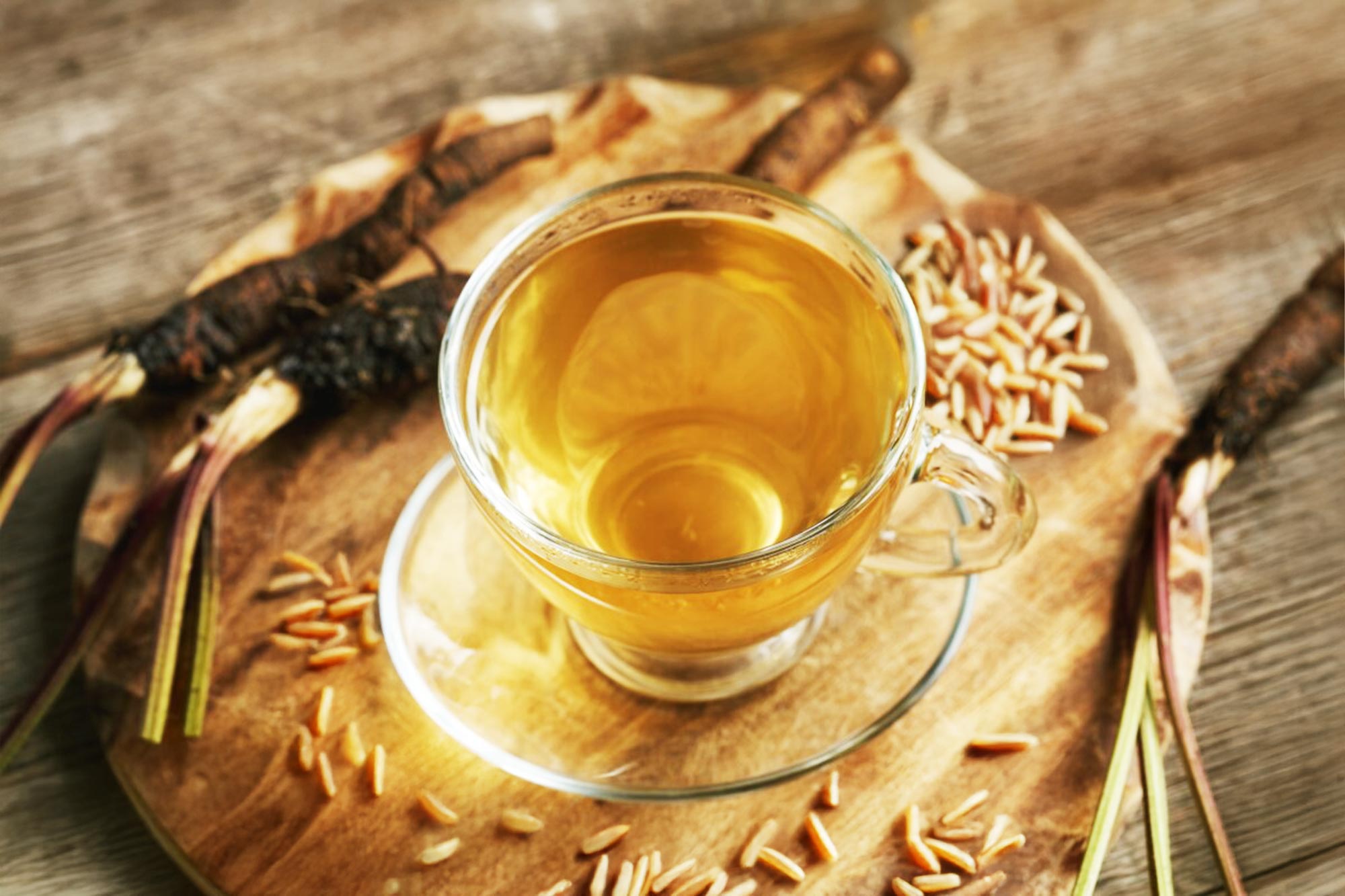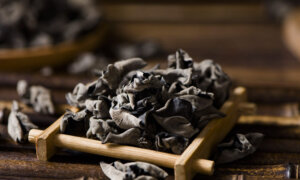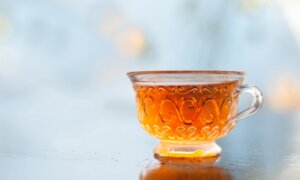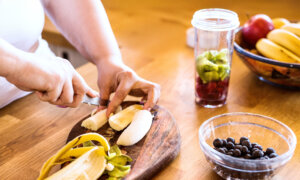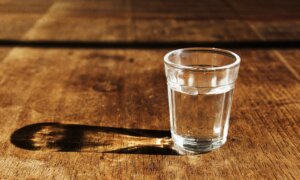Burdock root, often called “Oriental ginseng,” is celebrated for its affordability and rich nutritional profile.
In an episode of The Epoch Times’ “Health 1+1” program, Zhang Weijun, the fifth-generation successor of the esteemed Taiwanese traditional Chinese medicine (TCM) family Huai Sheng Tang and director of the Taichung Ji Sheng TCM Clinic, discussed the health benefits of burdock and shared a family remedy used to support recovery of physical function and vitality in cancer patients.
Burdock and Cancer Recovery
Zhang said that numerous patients with advanced-stage cancer seek his expertise to enhance their quality of life. He often recommends burdock brown rice tea, a remedy passed down through generations in his TCM lineage. The tea is believed to strengthen the immune system, boost energy levels, and inhibit cancer cell activity, potentially prolonging survival.
Many patients have reported experiencing noticeable improvements in vitality and physical condition after three months of regular consumption, with some even observing a gradual decline in previously stable cancer markers.
Ancient Chinese medical texts have historically documented the use of burdock in the treatment of tumors, and medical research also supports these claims.
A 2018 study showed that arctigenin, one of burdock’s primary active compounds, exhibited anti-tumor effects in both in vivo and in vitro experiments, significantly suppressing the growth of liver cancer cells. While promising, these early findings need to be supported by further clinical studies in humans to confirm efficacy and safety in cancer treatment.
The Power of Brown Rice
Brown rice is a rich source of B vitamins and trace minerals such as magnesium, potassium, and iron. Its high nutritional value can help restore physical strength and support immune function, which is particularly crucial for cancer patients.
Terminal cancer patients often have severely weakened immune systems, a condition further aggravated by prolonged chemotherapy. While chemotherapy targets cancer cells, it also damages healthy immune cells, leaving the body more vulnerable to infections and less capable of healing. Zhang noted that at this advanced stage, proper nutrition becomes vital, as malnutrition—rather than the cancer itself—often becomes the primary cause of death.
Recipe–Burdock Brown Rice Tea
Burdock brown rice tea offers significant support in cancer treatment and prevention by addressing critical nutritional needs.
Ingredients:
- 60 grams each of burdock root, carrot, daikon radish, and daikon radish leaves
- 60 grams brown rice
- 2 dried shiitake mushrooms
When selecting burdock root, choose those that are thick, heavy, and firm, and avoid those that feel soft or limp, Zhang said. Ideally, the root should have few fibrous hairs and a smooth outer skin.
To preserve its nutrients, avoid washing burdock root immediately after purchase; instead, rinse it just before use. Additionally, do not peel the skin, as it contains valuable nutrients such as saponins and polyphenols. Once sliced, soak the burdock in water to prevent oxidation.
Preparation:
- Rinse rice thoroughly, drain, and set aside.
- Wash the burdock root to remove any soil. Slice diagonally into thin pieces and soak in plain water.
- Soak mushrooms until softened, then cut in half.
- Wash carrot and daikon radish, trim both ends, and cut into chunks with skin on. Wash daikon leaves and cut into segments.
- Toast drained brown rice in a dry pan over medium heat until fragrant.
- Combine all ingredients in a pot and add plain water, using three times the volume of the ingredients.
- Bring to a boil over high heat, reduce to low heat, and simmer for two hours.
- Allow the mixture to cool and strain the liquid. For best results, drink it the same day and daily as a tea.
Burdock for Common Ailments
From ancient remedies to modern applications, burdock offers a range of potential benefits for common conditions.
Inflammation
Burdock
has been shown to reduce chronic inflammation, and when taken in larger amounts, it may also alleviate acute inflammation, Zhang said. One of the most common forms of acute inflammation is the common cold accompanied by fever. In such cases, burdock can be sliced and juiced with water, then strained and taken to help relieve seasonal cold symptoms.
Zhang recommends starting with dietary remedies when managing inflammation. If symptoms persist, it could indicate a more serious condition that requires prompt medical attention.
Obesity
From the perspective of TCM, obesity is generally classified into two types: qi deficiency and phlegm-stasis, Zhang said.
Qi deficiency obesity is associated with low energy in the body and a slowed metabolism. In this state, the body struggles to burn fat effectively, leading to persistent fatigue and poor appetite.
Phlegm-stasis obesity, on the other hand, is seen in people who have adequate energy and feel generally well, but whose overeating and lack of physical activity lead to poor circulation and the accumulation of “phlegm,” excess fat the body struggles to metabolize. This type of obesity can benefit from the use of burdock, which is traditionally employed to promote circulation and reduce phlegm.
Zhang recommends juicing burdock together with bitter melon to help clear accumulated phlegm. Incorporating moderate exercise can further boost circulation and enhance the body’s ability to eliminate phlegm-stasis.
High Blood Pressure
Burdock is rich in potassium, which can help lower blood pressure. Zhang recommends preparing a soup using three ingredients: burdock, daikon radish, and shiitake mushrooms.
Burdock is also high in fiber and oligosaccharides (short-chain carbohydrates). When cooked with daikon radish, the combination can stimulate digestion, relieve bloating, and promote regular bowel movements. This, in turn, helps prevent constipation-related spikes in blood pressure.
High Cholesterol
Elevated levels of low-density lipoprotein (LDL), or “bad” cholesterol, can increase the risk of cardiovascular disease. Burdock contains a high concentration of saponins, which help cleanse the blood vessels by removing harmful substances such as LDL cholesterol, Zhang said.
Diabetes
Burdock contains chlorogenic acid, which can
regulate abnormal spikes in blood sugar.
It is also rich in potassium and magnesium, both of which may help reduce the risk of developing diabetes.
Bacterial and Viral Infections
According to ancient Chinese medical texts, burdock was traditionally used to reduce fever during colds and flu, and applied topically to treat skin infections due to its antibacterial and anti-inflammatory properties.
Burdock may also help combat fungal infections, such as athlete’s foot and vaginal yeast infections, Zhang said.
Excessive sugar intake can encourage fungal growth in the body, and weakened immunity can further increase susceptibility. Regularly drinking burdock tea can help improve these conditions, according to Zhang.
Knee Osteoarthritis
Zhang said that many of his patients with knee osteoarthritis who sought acupuncture treatment reported faster recovery after regularly drinking burdock tea. A
randomized controlled trial found that burdock tea can reduce inflammation and oxidative stress in patients with knee osteoarthritis.
He recommends simmering a few slices of burdock in water to make a tea, adjusting the concentration to suit personal taste. For added nourishment and a hint of natural sweetness, goji berries can be included and simmered along with the burdock.
Constipation
Burdock is rich in dietary fiber, which stimulates intestinal movement and supports regular bowel movements, aiding in the body’s natural detoxification process.
Skin Conditions
In TCM, the skin is viewed as a reflection of liver health—when the liver is not functioning properly, skin issues are more likely to arise. Drinking burdock tea can help improve skin conditions, especially in those prone to acne, Zhang said.
A 2023 review indicated that burdock has liver-protective properties and may aid in the treatment of various skin disorders.
Additionally, polyphenols in burdock can stimulate bile secretion, which supports both liver and gallbladder function. This not only helps prevent gallstones but may also improve other liver- and gallbladder-related conditions, such as fatty liver and gallbladder polyps.
Kidney Disease
Diabetes is one of the leading causes of kidney problems, followed closely by chronic kidney inflammation, according to Zhang. An imbalance in gut microbiota can disrupt the immune system and trigger kidney inflammation, eventually leading to a decline in kidney function. Restoring a healthy balance of gut probiotics may therefore help slow the progression of kidney inflammation.
Burdock is a natural source of oligosaccharides—prebiotic compounds that nourish beneficial gut bacteria and support their growth. Zhang recommends incorporating burdock into one’s diet to promote a healthier gut environment, which can strengthen immune function and alleviate kidney inflammation.
However, he said that people with chronic kidney failure or those undergoing dialysis should avoid burdock, as it is high in potassium.
Potential Side Effects and Considerations
Burdock is generally well-tolerated with minimal side effects, he said. However, due to its naturally cooling properties, taking it in large quantities may lead to diarrhea, particularly in people who are physically frail or prone to digestive issues.
Additionally, burdock is high in fiber, and while small amounts are generally well-tolerated, excessive intake may cause gastrointestinal discomfort or pain. This can often be relieved by taking probiotics, which may ease the symptoms quickly.
In contrast, brown rice has a warming nature. When boiled together with burdock, the resulting tea achieves a balanced effect and is well-suited for daily health maintenance.
It is important to note that burdock is high in potassium. People with severe kidney disease, heart failure, or those taking diuretics or blood pressure medication should avoid taking it.
